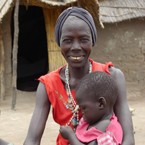
By Susan Gately - 28 December, 2013
Regional African leaders met in Kenya yesterday in an effort to make progress on a peace deal in South Sudan, where fighting erupted two weeks ago which has killed over 1,000 people.
The talks came a day after South Sudanese President Salva Kiir met in Juba with Kenyan President Uhuru Kenyatta and Ethiopian Prime Minister Hailemariam Desalegn.
Officials said afterwards that good progress had been made during the mediation talks.
However, in the meantime fighting continued to rage in the country’s oil-producing north.
Over a thousand people are believed to have died so far, and tens of thousands have fled their homes in clashes between forces loyal to Salva Kiir, the president, and Riek Machar, the former vice-president.
The violence began after what Mr Kiir called “an attempted coup” by Mr Machar, which prompted the arrest of several of his key political allies.
Most of the fighting is centred in Malakal and Bentiu capitals of South Sudan’s largest oil-producing states, but there have also been clashes in the nation’s capital Juba, where the Irish aid agency, Concern has its South Sudanese headquarters.
The Concern team in Juba said it was “closely monitoring the humanitarian situation”. Heavy fighting broke out in the capital on 15 December 2013, resulting in hundreds of casualties.
According to recent estimates, 34,000 people have been displaced by the violence and have sought refuge in UN bases in Juba, Bor and Bentiu.
“Humanitarian agencies have conducted an assessment in Juba and we plan to support this by providing supplies and access to clean water and sanitation,” said Níall Ó Murchú from Concern.
“Even during stable times, most people in South Sudan live in a state of extreme vulnerability. This crisis will only exacerbate the lack of access to food, water, adequate shelter and sanitation,” he added.
The UN admitted being caught off-guard by the violence in the region.
“We knew that there were tensions and that this could lead to problems, but I don’t think any South Sudanese or any of us observers in the country, and outside, expected an unravelling of the stability so quickly,” said Hilde Johnson, UN Special Representative of the Secretary General.
The UN said it hopes to shortly begin receiving critical reinforcements of military hardware and personnel to assist in the region – which gained independence from Sudan in 2011.
Concern has been working in South Sudan since 1994 in Aweil North and Aweil West in the Northern Bahr el Ghazal state. Recently the agency began to operate too in Koch County, Unity State.

Achok Deng Agok, a war widow, returned to South Sudan and is now growing her own food.
“This crisis becomes more tragic in the context of South Sudan’s 2011 independence and its efforts to building a new, more stable nation,” said Mr Ó Murchú.
He recalled the poignant words of Adut Atak-Atak, a mother and farmer, who is participating in the Concern Aweil Project Agriculture Development programme who told them at the end of a visit in 2012: “Until now, we have been surviving only with the help of others. This year, we will be able to feed ourselves. I know it.”
“The continued violence will place the hope of Adut, and millions of others, at risk,” he commented.
Mr Ó Murchú appealed to the public to continue to donate at www.concern.net so that they can continue their work in the region.